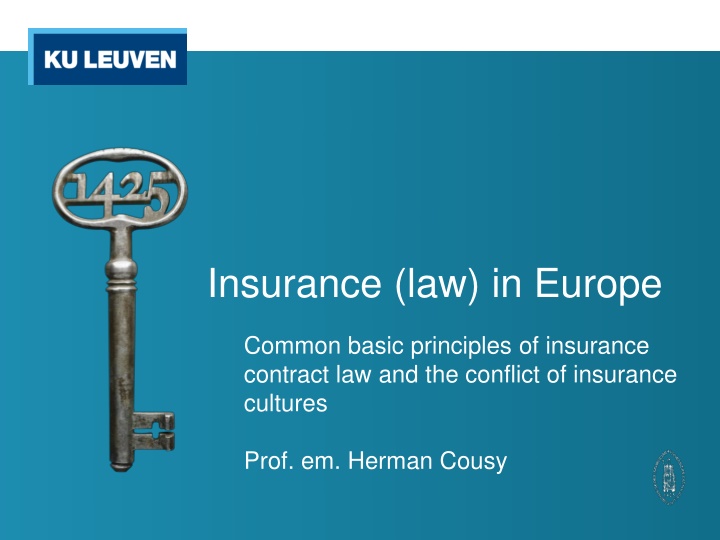Common Basic Principles of Insurance Contract Law in Europe
Explore the common basic principles of insurance contract law in Europe, including insurable interest, indemnity, utmost good faith, and contract of adhesion. Delve into the conflict of insurance cultures, comparing Alpine and Maritime approaches with insights on insurance intermediation practices. Discover the diverse perspectives and regulatory aspects shaping the insurance landscape in Europe.
Download Presentation

Please find below an Image/Link to download the presentation.
The content on the website is provided AS IS for your information and personal use only. It may not be sold, licensed, or shared on other websites without obtaining consent from the author.If you encounter any issues during the download, it is possible that the publisher has removed the file from their server.
You are allowed to download the files provided on this website for personal or commercial use, subject to the condition that they are used lawfully. All files are the property of their respective owners.
The content on the website is provided AS IS for your information and personal use only. It may not be sold, licensed, or shared on other websites without obtaining consent from the author.
E N D
Presentation Transcript
Insurance (law) in Europe Common basic principles of insurance contract law and the conflict of insurance cultures Prof. em. Herman Cousy
COMMON BASIC PRINCIPLES 1. Insurable interest 2. Principle of indemnity 3. Utmost good faith 4. Contract of adhesion
FIN DE SICLE: TWO VIEWS Frances Fukuyama, The End of History (1992) Michel Albert, Capitalisme contre capitalisme (Seuil, 1991)
TWO INSURANCE CULTURES Michel Albert, L avenir de l assurance , Risques. Les Cahiers de l Assurance, 1991, 181.
ALPINE versus MARITIME Where? ALPINE MARITIME Switzerland Germany (Bayern) Northern Italy British Isles The Netherlands
ALPINE INSURANCE CULTURE (1)Basic idea: security through mutual help (2)Easy access (3)Limited differentiation (4)Ex ante control of conditions and tariffs (5)Few bankruptcies (6)Stable client le (long-term contracts) (7)Stable shareholdership
ALPINE/MARITIME CULTURE ALPINE MARITIME (1) Basic idea: security through mutual help (2) Easy access (1) Basic idea: speculative and efficient handling of risks (2) Selectivity in underwriting (3) Limited differentiation (3) Segmentation of tariffs (4) Ex ante control of conditions and tariffs (5) Few bankruptcies (4) Control of the solvency of the company (5) Bankruptcies Guarantee Funds (6) Stable client le (long-term contracts) (7) Stable shareholdership (6) Short-term contracts: zapping (7) Shareholder s value and profitability
TWO (OR MORE) CULTURES OF INSURANCE INTERMEDIATION ALPINE MARITIME Supply: insurance is sold Demand: insurance is bought Agent Broker Commission fee/inducements, etc. Independent Good advice Best advice Regulation of products Regulation of service providers In-house concentration of services Outsourcing
TWO LEGAL CULTURES (?) ALPINE MARITIME (1) Civil law (1) Common law (2) Cartesian approach (2) Pragmatism (Prof. Clarke s elephant) (3) Detailed legislation (cfr. Colbert) (3) General rules (e.g. article 17 Marine Insurance Act) (4) Disclosure rules Causality requirement Proportional sanction (reduction) (5) Legal interpretation rules General rules Contra proferentem rule Pro insured (4) Warranties No causality requirement Loss of right (all or nothing (5) Taking business reality into consideration
THE MAKING OF THE INTERNAL MARKET A CLASH OF CULTURES Alpine majority versus maritime minority EU free market preference The detour of the second generation of directives (1988- 1990): large risks and mass risks The prevalence of the Maritime insurance tradition o Internal Market White Paper (1985) o Single European Act (1988) o Third generation (life and non-life) insurace directives (1992)
GENERAL GOOD (Allgemein Interesse) ECJ decided on direct effect of treaty provisions on free establishment and freedom services. Nevertheless, in the absence of community legislation, Member States can still impose restrictive national measures if they are protecting the general good, and are necessary, proportional and not discriminatory.
DID THE EU INTERNAL MARKET REACH ITS GOALS? 1. An integrated market with cross border provision of services? Not for mass risks ! Reason: non-harmonization of contract law 2. (More) competitive markets? Yes! EU: In competition we trust !

